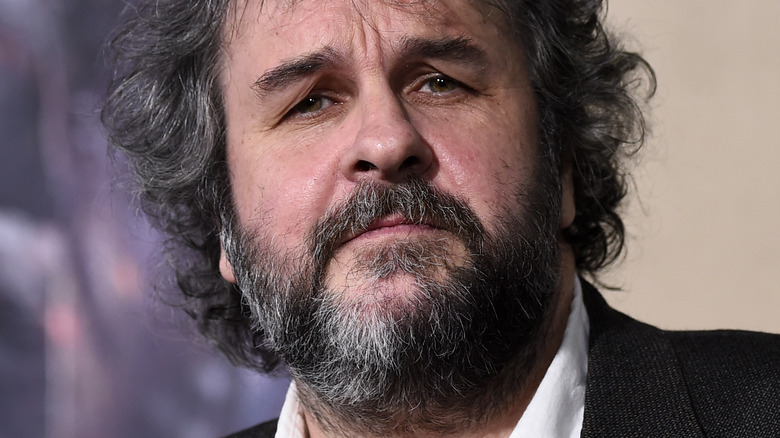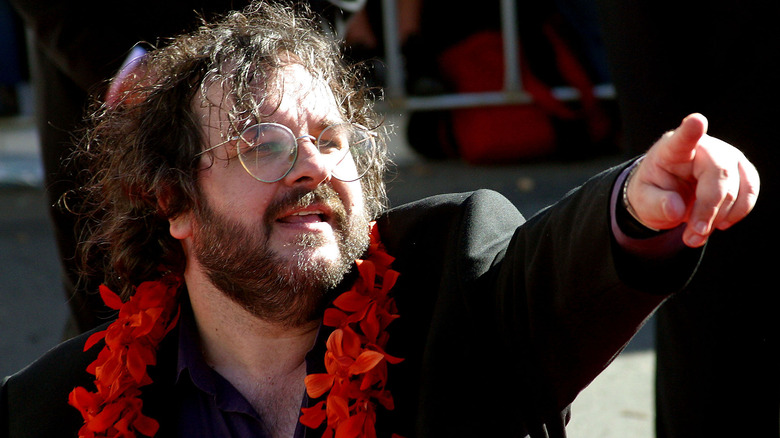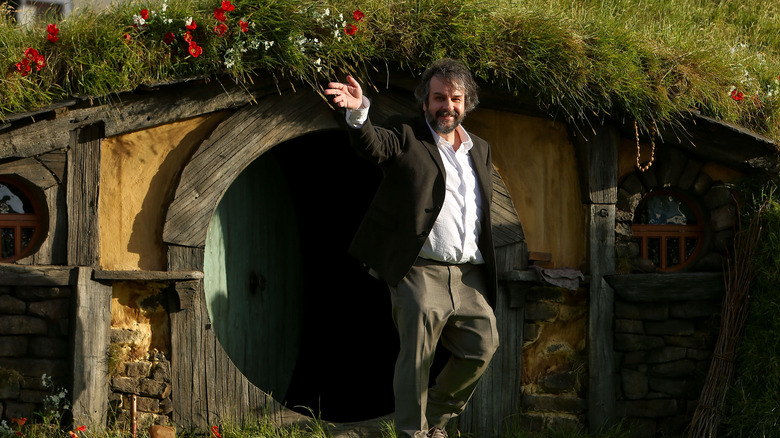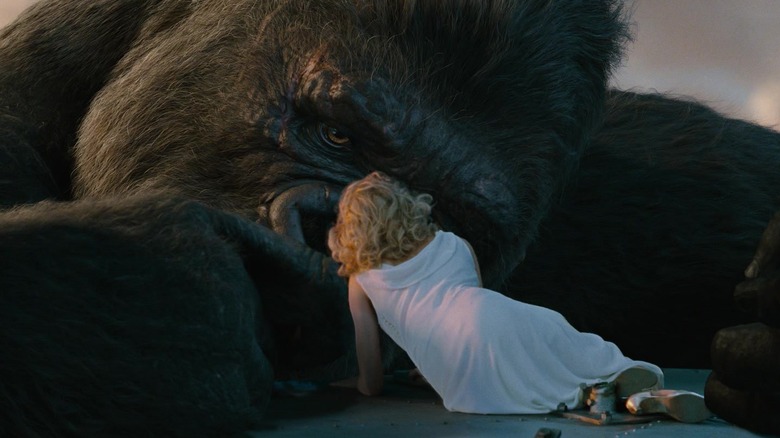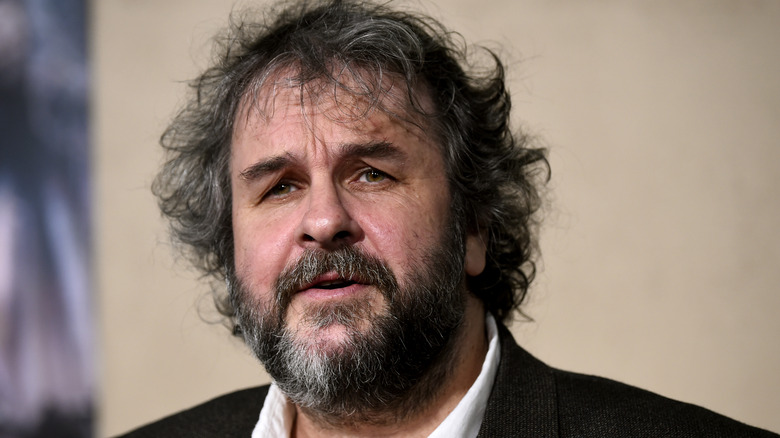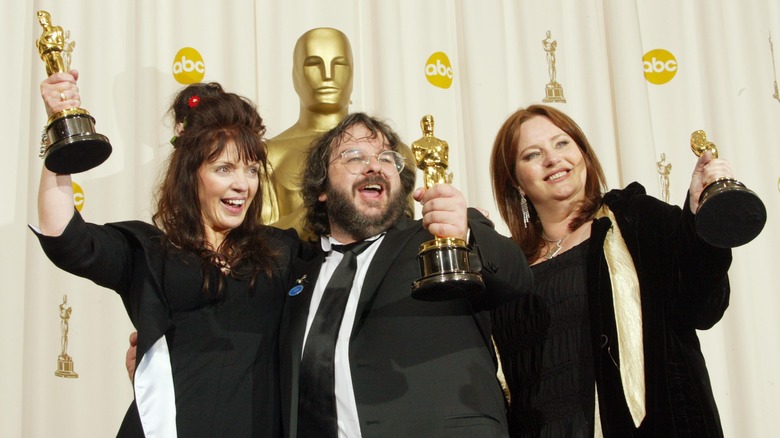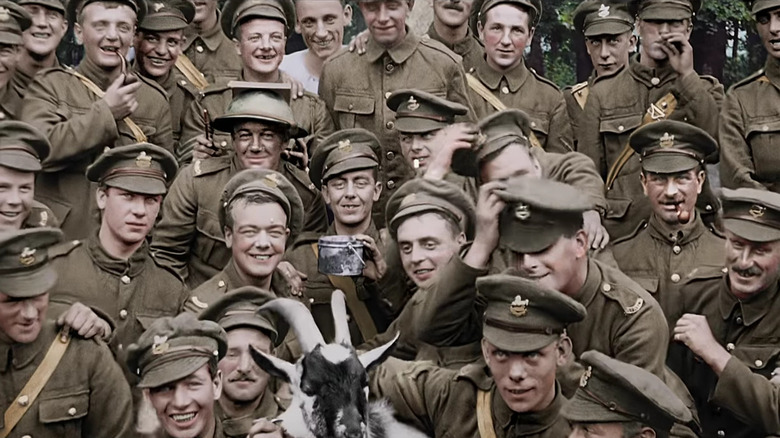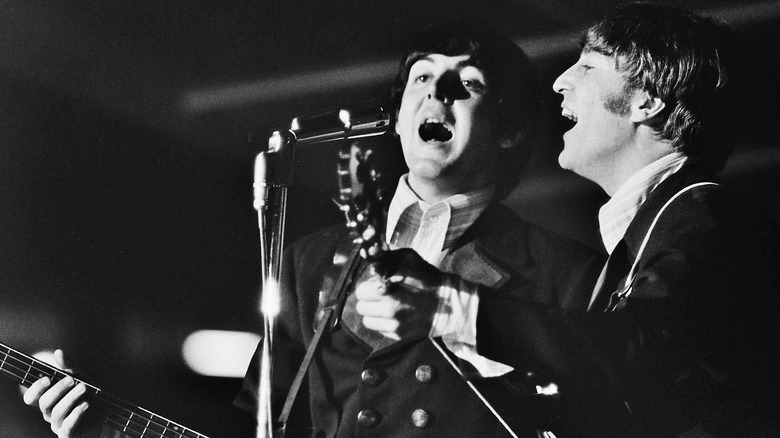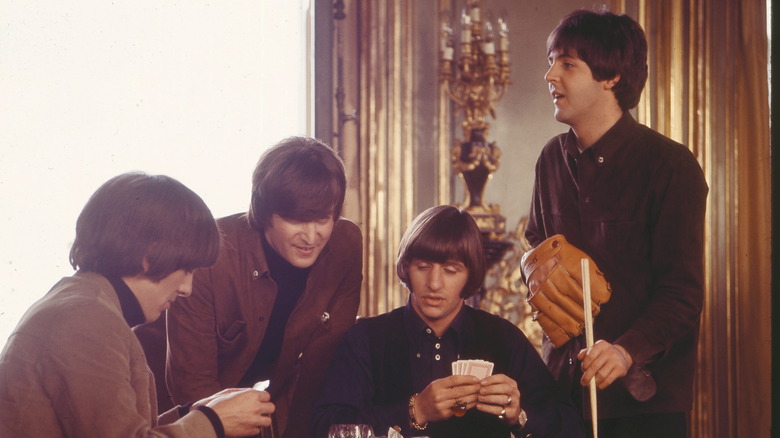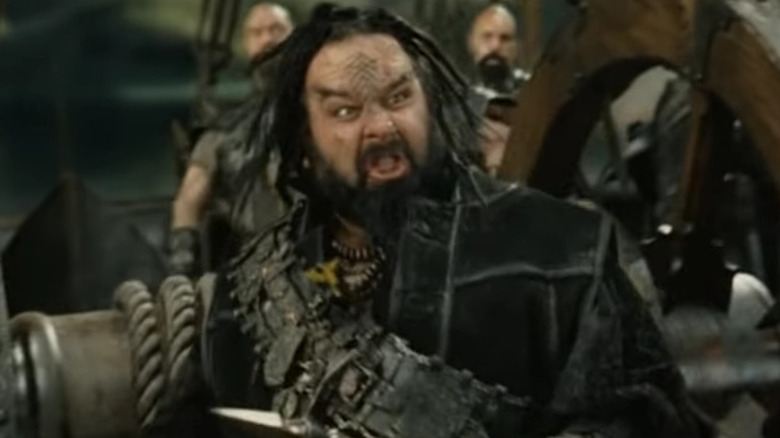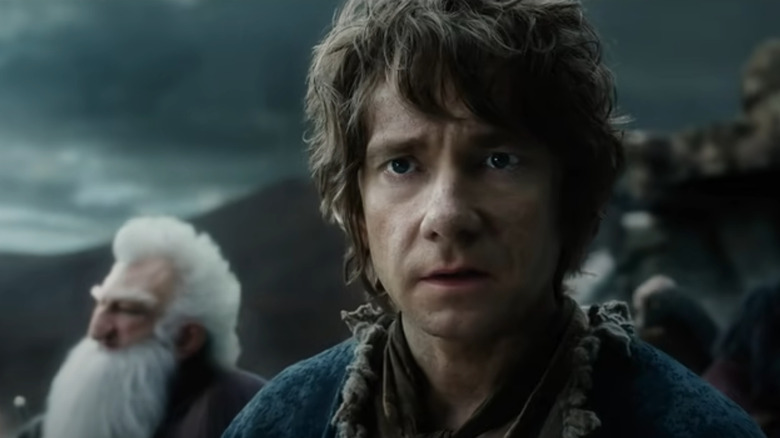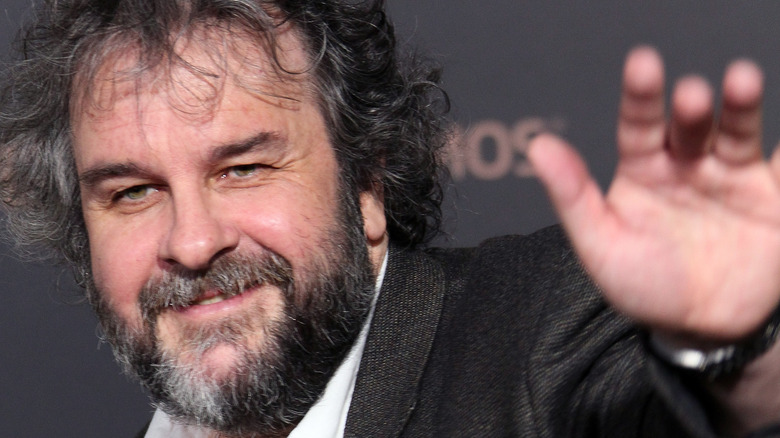The Untold Truth Of Peter Jackson
When Peter Jackson launched his directorial and acting career with the 1987 low-budget comedy horror "Bad Taste," few would have predicted the unassuming Kiwi would go on to become a world-beating heavyweight behind the camera. The movie about culinary connoisseurs from other planets with a taste for human flesh has an infectious energy and enthusiasm that critics ate up, but its gore-splattered silliness gave little indication of the colossus Jackson would become. Jackson gambled four years of his life on his movie debut and worked every weekend to get the special effects, script, direction, casting, and everything else just right (via the American Academy of Achievement). His belief in himself and passion to create a name for himself in the world of film were bulletproof from the get-go.
In the years between then and now, the name Peter Jackson has been associated with everything from epic and groundbreaking trilogies such as "The Lord of the Rings" and "The Hobbit" to a fly-on-the-wall six-hour-plus documentary about The Beatles. With three Oscars and nine total nominations, Jackson has ticked a lot of boxes and crossed many items off his to-do list. The man, who was born on Halloween, hasn't directed a fiction film since 2014's "The Hobbit: The Battle of the Five Armies" and has turned down the chance to direct "Aquaman" twice (via Empire). Yet you can bet your bottom dollar there'll be other big releases from Jackson in the future. While the world waits, let's dig into his untold truth.
He's a billionaire and the fourth highest-grossing film director of all time
When it comes to movie directors, there is an elite club that has figuratively stepped out from behind the camera to become household names. You don't have to be a film buff to be familiar with Steven Spielberg, Quentin Tarantino, Martin Scorsese, Tim Burton, and of course, Peter Jackson. Yet Jackson isn't just familiar to billions — he has billions in the bank too. Jackson's movies have shot him into the stratosphere — beneath Spielberg in the No. 1 slot, and the Russo brothers in second and third, Jackson is the fourth highest-grossing film director of all time (per Statista). As of October 2021, his films have earned a worldwide box office revenue of $6.54 billion.
Jackson is worth an estimated $1.5 billion (per Forbes). In 2022, his name popped up amongst 2,667 other people on Forbes 36th Annual World's Billionaire List. A large percentage of Jackson's wealth came from selling his visual effects studio, Weta Digital. Jackson co-founded Weta in 1993. The studio has been used to add another dimension to films such as the Andy Serkis-starring "Planet of the Apes" trilogy, "Avatar," and "Wonder Woman," winning six Academy Awards in the process. Weta Digital was bought by Unity software in 2021 for $1.63 billion (per The Guardian). Jackson and wife Fran Walsh pocketed a cool $975 million for their controlling 60 percent (per The Software Report).
Before The Lord of the Rings, there was gore, and lots of it!
When New Line Cinema announced at the turn of the century that a largely unknown director from New Zealand called Peter Jackson would be filming a three-movie adaptation of J.R.R. Tolkien's "The Lord of the Rings," most movie fans replied, "Peter who?" The studios were taking a big gamble backing a rank outsider with such a well-loved book franchise, not to mention handing him over $300 million on a plate (per Variety). Jackson didn't have the most impressive track record. His previous and only Hollywood outing had been the commercial flop Michael J. Fox vehicle "The Frighteners" (via Paste). The only other films in his portfolio were "Bad Taste," "Meet the Feebles," the critically acclaimed "Heavenly Creatures," and "Braindead" aka "Dead Alive."
Those familiar with Jackson's work in 1992's "Dead Alive" raised an eyebrow when Jackson's name was pinned to Middle-Earth. The gore and shock comedy surrealism of "Dead Alive" is a million miles removed from the gravitas and emotive narrative of Frodo (Elijah Wood) and the gang. Yet it was knee-deep in the pre-CGI blood, guts, and bad jokes of "Dead Alive" that a young Peter Jackson came of age and acted as a midwife to a splatterfest that would become a cult classic (via Little White Lies). Like "Evil Dead 2," but with a New Zealand accent and minus the tension, "Dead Alive" plays for laughs and shocks and gets both. Jackson told The Hollywood Reporter he'd be happy to "be disgusting again if the right project comes along."
He's been obsessed with King Kong since he was a boy
When Peter Jackson was a 9-year-old kid, watching the 1933 classic "King Kong" had a profound effect upon him. The tragic tale of the king ape snatched from his natural paradise, shackled in chains, and transported to the claustrophobic concrete and clay of New York City has a timeless quality. In an interview with Three Monkeys Online, Jackson explained that watching "King Kong" made him want to become a filmmaker and create similar magic.
Jackson said, "I've no idea whether I would still be making films if I hadn't seen 'King Kong.' But I remember [...] the very next day after I saw 'King Kong' I started making little stop motion films with a Super 8 movie camera that my parents had used for home movies." Over three decades later, Jackson remade the film that captivated him as a boy. With modern technology, Jackson felt he could add something special and new to a "wonderful story and a wonderful premise." He even used his resources on the remake to bring to life a famously lost sequence from the original "King Kong": a harrowing sequence when the crew falls into an insect pit (per Neatorama). Not only did Jackson make his own creepy crawly sequence in his 2005 film, but he also recreated the insect pit scene as a special feature, using stop-motion and black-and-white rear-projection, just as they would've done it in the '30s.
Peter Jackson and the Tolkien family aren't the best of friends
Peter Jackson's "The Lord of the Rings" and "The Hobbit" trilogies introduced a new generation of fans to the richly complex and fantastical nature of Middle-Earth. After they left the movie house, many cinemagoers were inspired to go straight to the source material and pick up copies of J.R.R. Tolkien's books for the first time. Given such a scenario you'd imagine that the Tolkien estate would be grateful to Jackson for helping spread the word of their most famous family member far and wide. Yet according to CinemaBlend, the son of the late author, Christopher Tolkien, was not exactly a fan of Jackson's work on LOTR.
In an interview with Le Monde, he said, "They gutted the book, making an action movie for 15- to 25-year-olds. Tolkien became ... devoured by his popularity and absorbed by the absurdity of the time. The gap widened between the beauty, the seriousness of the work, and what it has become is beyond me." Furthermore, New Line Cinema, the producers, had financial squabbles with the Tolkien estate, allegedly refusing to pay them (per CinemaBlend). When asked at San Diego Comic-Con if there was any chance of adapting Tolkien's posthumous "The Silmarillion" after he had wrapped up "The Hobbit," trilogy, the director explained, "I don't think the Tolkien estate liked those films. I don't think 'The Silmarillion' will go anywhere for quite a long time."
His partner Fran Walsh won three Academy Awards for Return of the King
There must be a bit of jostling for prominent ornament space in the Peter Jackson-Fran Walsh household. Not only has he won three Oscars, a Golden Globe, three BAFTAs, and four Saturn Awards, but his partner Fran Walsh also has an impressive cabinet of filmmaking trophies, which includes three Academy Awards, a Golden Globe, two BAFTAs, and one Saturn Award. It's safe to say they're something of a power couple. Walsh has teamed up with her partner on all filmmaking projects since 1989's "Meet the Feebles" (per NZOnScreen). After helping to script "Heavenly Creatures," she was given her first Oscar nomination as a co-writer. She received further nominations for "The Fellowship of the Ring" and "The Two Towers." Yet it wasn't until "Return of the King" that the nominations turned into resounding victories.
Walsh scooped a hat-trick of Oscars as co-winner in Best Original Song for "Into the West," Best Adapted Screenplay, and Best Picture. As a co-writer of "Into the West" she also won a Grammy. Along with Jackson and Philippa Boyens, Walsh was part of the core team responsible for all the "Lord of the Rings" scripts. Though Walsh has a reputation for being "wildly important yet intensely private," in 2012, The New York Times wrote, "Ms. Walsh has a knack for conveying emotion, Ms. Boyens excels at structure (and line readings), and Mr. Jackson is the visual genius" — she's a crucial part of a crack creative team.
His grandfather inspired him to make They Shall Not Grow Old
Watching sped-up, silent, and grainy documentary footage from World War I always had a slightly unreal quality that made the terrible events of over a century ago feel far more removed from reality than they actually are. That all changed in 2018 when Peter Jackson released his groundbreaking documentary, "They Shall Not Grow Old." By adding color to a formerly black-and-white reality and giving voice to those who had been rendered mute, Jackson helped humanize a heartbreaking chapter in history for a new generation. The director was heavily invested in the documentary both personally and professionally. The Daily Mail reports that although Jackson never met his grandfather, who fought in the Somme, Passchendaele, and Gallipoli, he is responsible for Jackson's long-term interest in the conflict.
In a BBC documentary, Jackson explained he found a photo of his grandfather, William Jackson, who fought in the South Wales Borderers, in a military museum in Brecon, Wales. "I found a shot of the British troops in the trenches, and my grandfather was standing there with a cigarette in his mouth. He's got that James Dean pose, and he looks really cool," explained Jackson. Reflecting on his reason for making the documentary, the director explained, "I wanted to reach through the fog of time and pull these men into the modern world, so they can regain their humanity once more" (per NME).
Peter Jackson was responsible for Paul McCartney's reunion with John Lennon
During selected dates on Paul McCartney's 2022 "Got Back" tour, the audience was treated to something fans of The Beatles have dreamed about since that famous final rooftop gig in 1969 — John Lennon and Macca singing onstage together again (per Loudwire). Okay, it may have been a virtual John Lennon, and it was only for one song, but it was a pretty special moment for all involved. However, the "live" reunion wouldn't have been possible at all if it weren't for Peter Jackson.
Whilst working on his 2021 "The Beatles: Get Back" documentary, Jackson told Variety, "To me, the sound restoration is the most exciting thing. We have made some huge breakthroughs in audio." One of these breakthroughs involved the manipulation of artificial intelligence to isolate Lennon's voice from any background noise or interference during a live performance (via The Daily Mail). By taking Lennon's vocals and footage off the rooftop rendition of "I've Got A Feeling" and blowing them up on a screen on stage, McCartney was able to sing live with his old songwriting buddy for the first time since 1974 (per Far Out Magazine).
Vanity Fair reports that Jackson trawled through about 60 hours of footage from the "Let It Be" sessions and knew it would make for a heartwarming and unique documentary. Meeting a surprisingly nervous Paul McCartney backstage at an Auckland gig, Jackson explained that at first, the former Beatles bassist had reservations about the project but that when he saw the footage, he agreed with Jackson's verdict, "It shows you guys having a great time."
The Beatles could have ruined Peter Jackson's chances to direct the Lord of the Rings trilogy
In one of those simple quirks of fate, if The Beatles' idea to make a film version of "The Lord of the Rings" had gone to plan in 1968, then Peter Jackson's career would have taken a very different trajectory. When J.R.R. Tolkien turned down the Fab Four's offer to adapt his book, Jackson was only 6 years old. If John, Paul, George, and Ringo had put their own distinctive stamp on Middle-Earth, would Jackson have ended up putting together the "Get Back" doc? Such questions are for an alternate universe, but in a musical that Stanley Kubrick was in the running to direct, the roles of Frodo, Gollum, Gandalf, and Sam, were rumored to be played respectively by McCartney, Lennon, Harrison, and Starr (per the BBC).
Jackson believes The Beatles first read the story whilst studying in India with Maharishi Mahesh Yogi. They hatched a plan to do a film, but Tolkien wasn't so keen on a pop group tweaking his classic epic and nipped the idea in the bud. Jackson revealed that McCartney later confided in him that he was glad The Beatles never went ahead with it because it allowed Jackson to create his masterpiece. Yet Jackson confesses that he thinks it's a shame that The Beatles never got to do their musical version. "What would The Beatles have done with a 'Lord of the Rings' soundtrack album? That would have been 14 or 15 Beatles songs that would have been pretty incredible to listen to," he said.
Peter Jackson loves making cameos
Who can blame Peter Jackson for doing an Alfred Hitchcock and bagging a cameo for himself in all his major films? Let's rewind a tape and take a look. In "The Fellowship of the Ring" and "The Desolation of Smaug," you can find him as a stranger in Bree aggressively munching on a carrot. Watch the battle of Helm's Deep carefully in "The Two Towers," and you'll notice Jackson as an enthusiastic soldier of Rohan throwing a spear at the horde of invading orcs. In "The Return of the King," he can be found as a pirate-looking villain on a corsair ship who, in the extended version, is later shot by Legolas (Orlando Bloom).
In "An Unexpected Journey," he can be seen fleeing from the dragon with other dwarves as the Lonely Mountain burns. In "The Battle of the Five Armies," he appears alongside his real-life partner Fran Walsh in a portrait of Bilbo Baggins' (Martin Freeman) mother and father. Jackson's children also appear briefly in all three films. Jackson also makes a similar cameo in "King Kong" to that of original director Merian C. Cooper. He plays the gunner in the plane which attacks the crazed ape as he scales the Empire State Building. He's cameoed in most of his other films, too, including a prominent role in "Dead Alive."
Peter Jackson was obsessed with Martin Freeman playing Bilbo Baggins
Now that "The Hobbit" films have cemented a place in popular culture, it is difficult to think of Bilbo Baggins without seeing the earnest and robustly cheerful face of Martin Freeman. Before the roles were cast and the shooting began, the bashful Brit wasn't exactly most people's prime contender for the role of Bilbo. Yet for the man who had the deciding vote, there was no one else who could play the furry-footed little fella. According to The Hollywood Reporter, Peter Jackson burned the midnight oil watching episodes of "Sherlock" featuring Freeman as Watson and decided that the "Office" actor was born to be Bilbo.
Jackson explained, "Martin was the only person that we wanted for that role, and that was really before we met Martin. [...] We just felt he had qualities that would be perfect for Bilbo. The stuffy, repressed English quality. He's a dramatic actor, he's not a comedian, but he has a talent for comedy." Freeman had never read Tolkien but was a fan of Jackson's work and so jumped at the opportunity. Yet it wasn't all plain sailing. Freeman was still contracted to film episodes of "Sherlock" whilst "An Unexpected Journey" was being filmed. A compromise was reached: Jackson agreed to reschedule an entire shoot to accommodate Freeman's obligations. It's nice to be wanted!
Peter Jackson prefers working in the cutting room to shooting on set
For such a universally acclaimed director, it's something of a surprise to hear Peter Jackson dismiss actual on-set direction as a "pain in the a***." Yet that's exactly what Jackson informed the press at London Film Festival in 2018 (per the Independent). Discussing his WWI documentary, "They Shall Not Grow Old," Jackson enthused, "I love when we get to the cutting room. I sigh with relief, that is when I'm in my element in filmmaking." Jackson's movies are usually epic in scope and tend to be famed for their special effects, so opting for the sanctuary of the editing suite over the chaos of the green screen seems pretty reasonable.
Discussing his newfound love of documentary-making during the filming of "They Shall Not Grow Old," Jackson explained, "Normally in a movie, you write a script — I never wrote a script for this — and you go out and shoot a movie, but I never shot a movie. [...] It was all just footage that someone else had shot for me, on a battlefield 100 years ago, so it was really a cutting room film." Whether it's another "cutting room film" or a big fantasy epic, we can't wait to see what Jackson has in store for us next.
